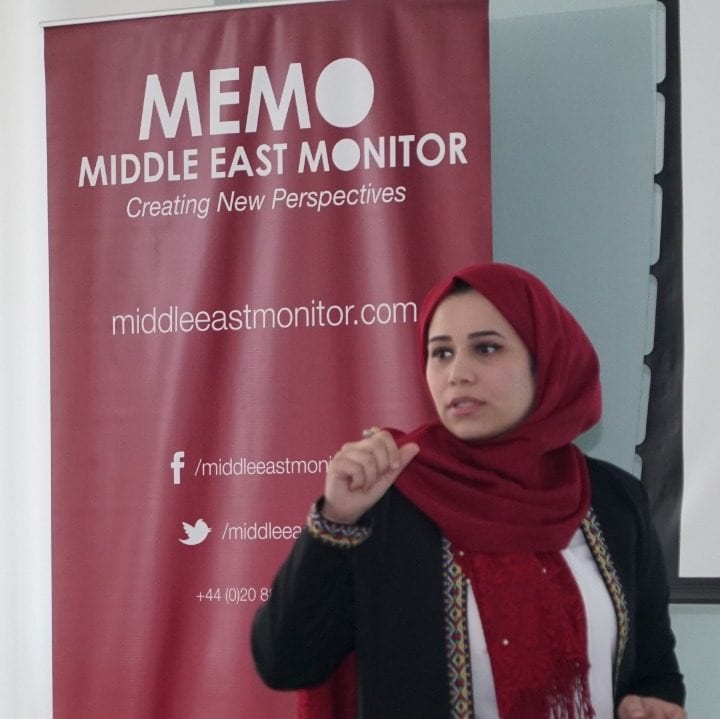Social media has played a major role in spreading awareness of the Palestinian cause, providing a voice to those marginalised by the mainstream. Now, though, social media outlets are excluding Palestinian voices from their platforms in order to silence them. Dozens of Palestinian pages and accounts have been removed, banned or restricted, and specific terminology often leads to users being suspended, especially on Facebook.
Controlling social media is a characteristic of dictatorships. What we are witnessing in the pro-Palestine arena is digital apartheid. Israel and its supporters in influential positions are, it seems, doing everything possible to prevent the reality of the colonial state’s brutal occupation and what it means for the Palestinians from reaching the outside world.
Facebook has now removed the page of the Palestinian Shehab News Agency, for example. Shehab is one of the largest Palestinian news pages on social media with more than 7.5 million followers on Facebook alone. “This is a violation of human rights and international laws that guarantee freedom of opinion and expressions,” insisted the director of the agency, Remah Mubarak. “It is a clear targeting of Palestinian content.”
READ: Facebook deletes dozens of misleading pages and groups in 3 Arab countries
As long as the content is positive about Palestine and its people, it seems, Facebook will censor it. “During the latest Israeli aggression on Gaza, our social media team at Shehab was in touch with a specialised team from Facebook. The platform imposed many unreasonable restrictions on us in terms of publishing and editing. Despite our agreement and commitment to these conditions, Facebook deleted our page completely.”
فيس بوك يحذف صفحة وكالة شهاب للأنباء ويحجب محتواها عن 7.5 مليون متابع، ضمن سياسة محاربة المحتوى الفلسطيني pic.twitter.com/ahAZKNGhbO
— وكالة شهاب للأنباء (@ShehabAgency) July 13, 2021
This is the fifth time that Facebook has done this to Shehab since the agency was established in 2009. “There is no justification for this other than it being a response to Israeli pressure,” explained Mubarak.
The social media giant’s move has been rejected and condemned widely by media professionals and pro-Palestine activists. Palestinian journalists have called it “arbitrary and unfair”. According to Shehab editor Mohammed Haniya, Facebook’s action is simply a part of direct Israeli incitement against the agency. “Since I joined Shehab Agency in 2016, I have seen a continuous campaign of pressure against our news page on Facebook. This is the leading Palestinian page and the tenth most popular in the Arab world, according to annual digital ratings.”
PHOTOS: Gaza protests Facebook’s decision to silence Palestinian voices
![Mohammed Haniya, Presenter and Editor at Shehab Agency [Shehab Agency]](https://i0.wp.com/www.middleeastmonitor.com/wp-content/uploads/2021/07/mohammed-hanya.jpeg?resize=500%2C331&ssl=1)
Mohammed Haniya, Presenter and Editor at Shehab Agency [Shehab Agency]
Over the past few weeks, we have also witnessed social media censorship of events in the Jerusalem neighbourhood of Sheikh Jarrah. The voices of Sheikh Jarrah residents, as well as Palestinian and international solidarity activists, have been targeted by Facebook, Twitter and Instagram “systematically”. Social media companies have closed personal accounts and censored content about attacks on residents and activists by Israeli forces and illegal settlers in the occupied East Jerusalem neighbourhood.
Instagram just let me know they might delete my account 🙂 because posting videos of state-sanctioned ethnic cleansing is against their community standards I guess 🙂
— Mohammed El-Kurd (@m7mdkurd) May 5, 2021
Nevertheless, despite such efforts by social media to restrict Palestinian content and whitewash Israeli crimes, awareness of the Palestinian cause is growing. A recent opinion poll has shown that there is also a corresponding fall in the support of the American people for Israel since the May offensive against Palestinian civilians in Gaza.
“Whenever they bring us back to ground zero,” Shehab’s Remah Mubarak added, “We come back stronger and more determined than ever to convey the Palestinian message to the world.” This much is evident from the fact that global sympathy for the Palestinians is growing at the expense of the Israeli occupation.

![Remah Mubarak speaks at a protest against Facebook, July 2021 [Shehab Agency]](https://i0.wp.com/www.middleeastmonitor.com/wp-content/uploads/2021/07/cover.jpeg?fit=920%2C613&ssl=1)







